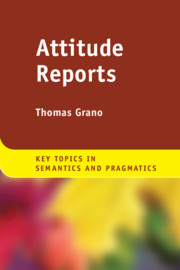2 - Foundations
Published online by Cambridge University Press: 15 April 2021
Summary
This chapter introducesattitude reports in possible worlds semantics, with attention to the motivation of such an approach and its main challenges, and the major revisions and alternatives that such challenges have prompted. We begin with a brief introduction to possible worlds semantics. We then sketch Jaakko Hintikka’s highly influential possible worlds-based approach to attitude reports and outline the key predictions that it makes. We discuss the problem of logical omniscience that Hintikka’s approach faces, and outline two competing approaches for solving it. We then turn to the more basic problem of logical equivalence that any approach to attitude reports in possible worlds semantics faces; we discuss several solution strategies thatgo under the name ‘hyperintensionality’ in that they proffer ways of modeling propositions that achieve a finer grain than do possible worlds. A recurring question in this discussion is: Which of our intuitions about inference patterns in attitude reports reflect semantic reasoning, and which reflect pragmatic or extra-linguistic reasoning? Finally, we explore two competing hypotheses regarding the compositional semantics of attitude reports.
Keywords
- Type
- Chapter
- Information
- Attitude Reports , pp. 15 - 65Publisher: Cambridge University PressPrint publication year: 2021

